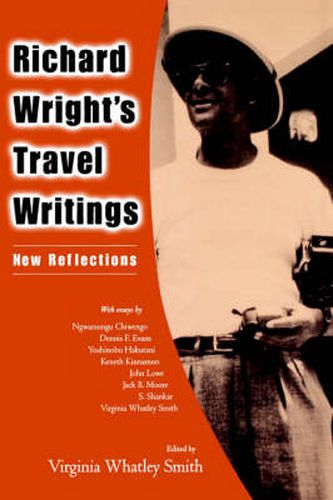Readings Newsletter
Become a Readings Member to make your shopping experience even easier.
Sign in or sign up for free!
You’re not far away from qualifying for FREE standard shipping within Australia
You’ve qualified for FREE standard shipping within Australia
The cart is loading…






This title is printed to order. This book may have been self-published. If so, we cannot guarantee the quality of the content. In the main most books will have gone through the editing process however some may not. We therefore suggest that you be aware of this before ordering this book. If in doubt check either the author or publisher’s details as we are unable to accept any returns unless they are faulty. Please contact us if you have any questions.
Attracted to remote lands by his interest in the postcolonial struggle, Richard Wright (1908-1960) became one of the few African Americans of his time to engage in travel writing. He went to emerging nations not as a sightseer but as a student of their cultures, learning the politics and the processes of social transformation. When Wright fled from the United States in 1946 to live as an expatriate in Paris, he was exposed to intellectual thoughts and challenges that transcended his social and political education in America. Three events broadened his world view- his introduction to French existentialism, the rise of the Pan-Africanist movement to decolonize Africa, and Indonesia’s declaration of independence from colonial rule in 1945. During the 1950s as he traveled to emerging nations his encounters produced four travel narratives-Black Power (1953), The Color Curtain (1956), Pagan Spain (1956), and White Man, Listen! (1957). Upon his death in 1960, he left behind an unfinished book on French West Africa, which exists only in notes, outlines, and a draft. Written by multinational scholars, this collection of essays exploring Wright’s travel writings shows how in his hands the genre of travel writing resisted, adapted, or modified the forms and formats practiced by white authors. Enhanced by nine photographs taken by Wright during his travels, the essays focus on each of Wright’s four separate narratives as well as upon his unfinished book and reveal how Wright drew on such non-Western influences as the African American slave narrative and Asian literature of protest and resistance. The essays critique Wright’s representation of customs and people and employ a broad range of interpretive modes, including the theories of formalism, feminism, and postmodernism, among others. Wright’s travel books are proved here to be innovative narratives that laid down the roots of such later genres as postcolonial literature, contemporary travel writing, and resistance literature. Virginia Whatley Smith is an associate professor of English at the University of Alabama, Birmingham. Her work has appeared in African American Review, Mississippi Quarterly, and MLA Approaches to Teaching Wright’s ‘Native Son.
$9.00 standard shipping within Australia
FREE standard shipping within Australia for orders over $100.00
Express & International shipping calculated at checkout
This title is printed to order. This book may have been self-published. If so, we cannot guarantee the quality of the content. In the main most books will have gone through the editing process however some may not. We therefore suggest that you be aware of this before ordering this book. If in doubt check either the author or publisher’s details as we are unable to accept any returns unless they are faulty. Please contact us if you have any questions.
Attracted to remote lands by his interest in the postcolonial struggle, Richard Wright (1908-1960) became one of the few African Americans of his time to engage in travel writing. He went to emerging nations not as a sightseer but as a student of their cultures, learning the politics and the processes of social transformation. When Wright fled from the United States in 1946 to live as an expatriate in Paris, he was exposed to intellectual thoughts and challenges that transcended his social and political education in America. Three events broadened his world view- his introduction to French existentialism, the rise of the Pan-Africanist movement to decolonize Africa, and Indonesia’s declaration of independence from colonial rule in 1945. During the 1950s as he traveled to emerging nations his encounters produced four travel narratives-Black Power (1953), The Color Curtain (1956), Pagan Spain (1956), and White Man, Listen! (1957). Upon his death in 1960, he left behind an unfinished book on French West Africa, which exists only in notes, outlines, and a draft. Written by multinational scholars, this collection of essays exploring Wright’s travel writings shows how in his hands the genre of travel writing resisted, adapted, or modified the forms and formats practiced by white authors. Enhanced by nine photographs taken by Wright during his travels, the essays focus on each of Wright’s four separate narratives as well as upon his unfinished book and reveal how Wright drew on such non-Western influences as the African American slave narrative and Asian literature of protest and resistance. The essays critique Wright’s representation of customs and people and employ a broad range of interpretive modes, including the theories of formalism, feminism, and postmodernism, among others. Wright’s travel books are proved here to be innovative narratives that laid down the roots of such later genres as postcolonial literature, contemporary travel writing, and resistance literature. Virginia Whatley Smith is an associate professor of English at the University of Alabama, Birmingham. Her work has appeared in African American Review, Mississippi Quarterly, and MLA Approaches to Teaching Wright’s ‘Native Son.